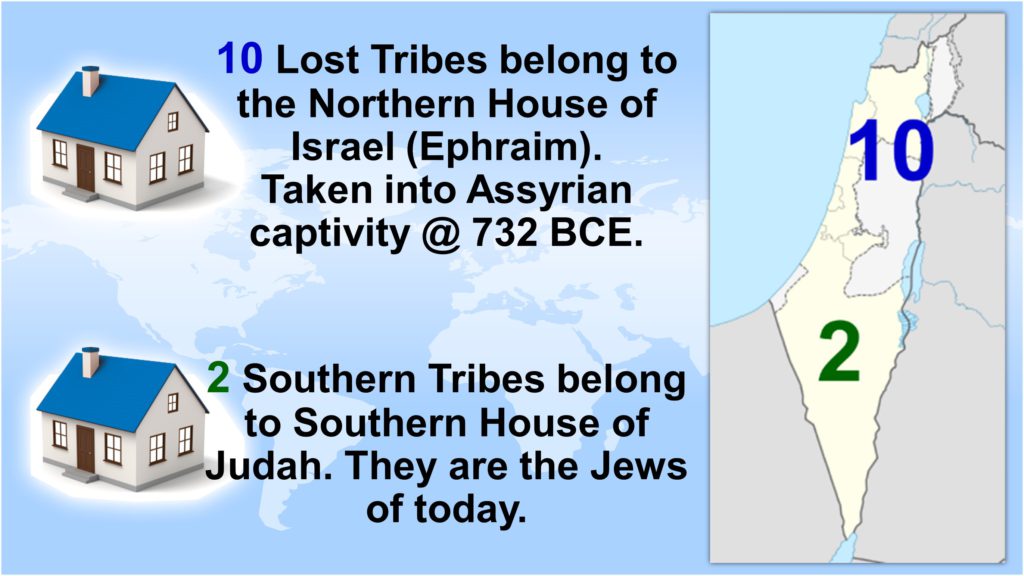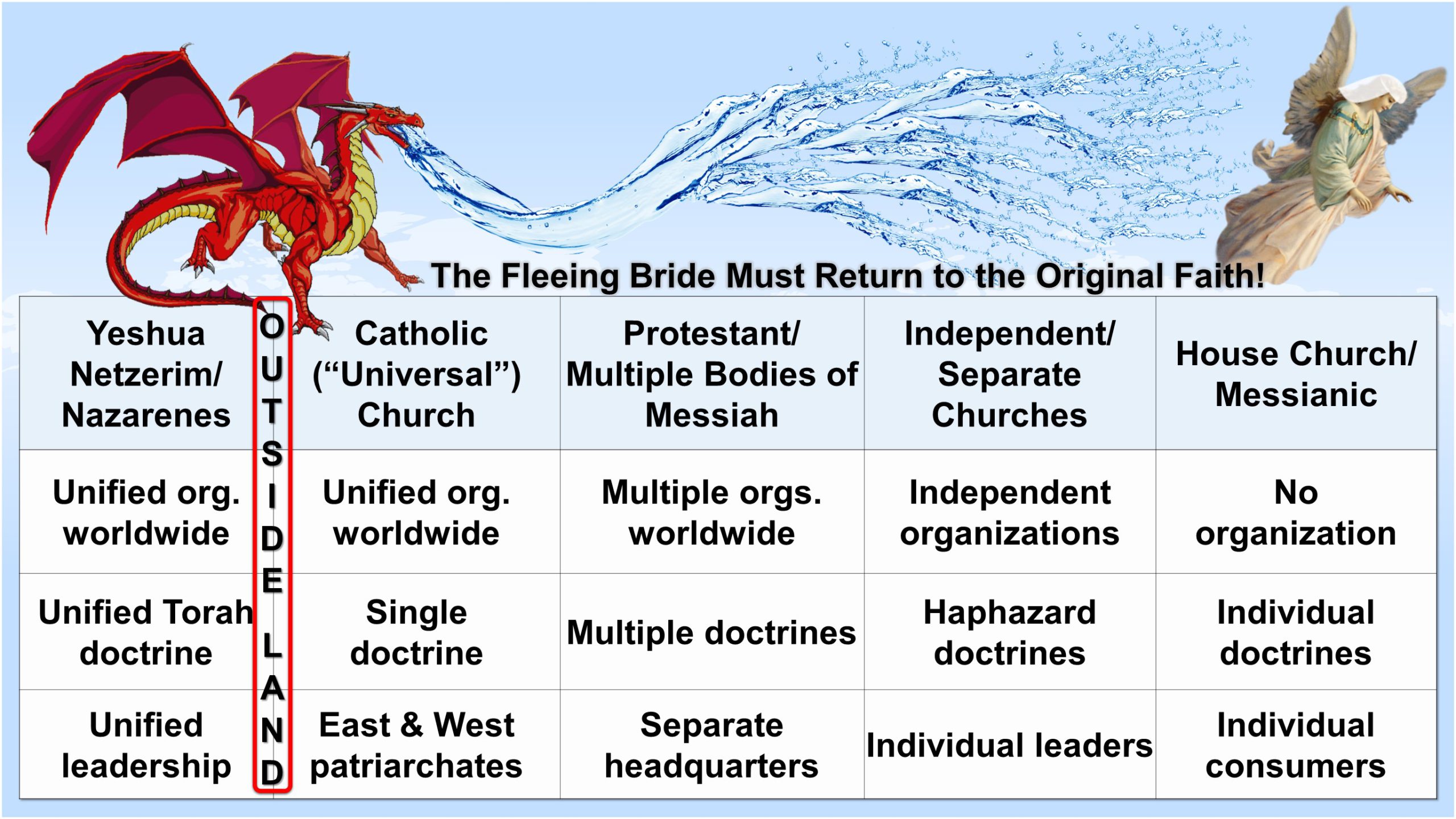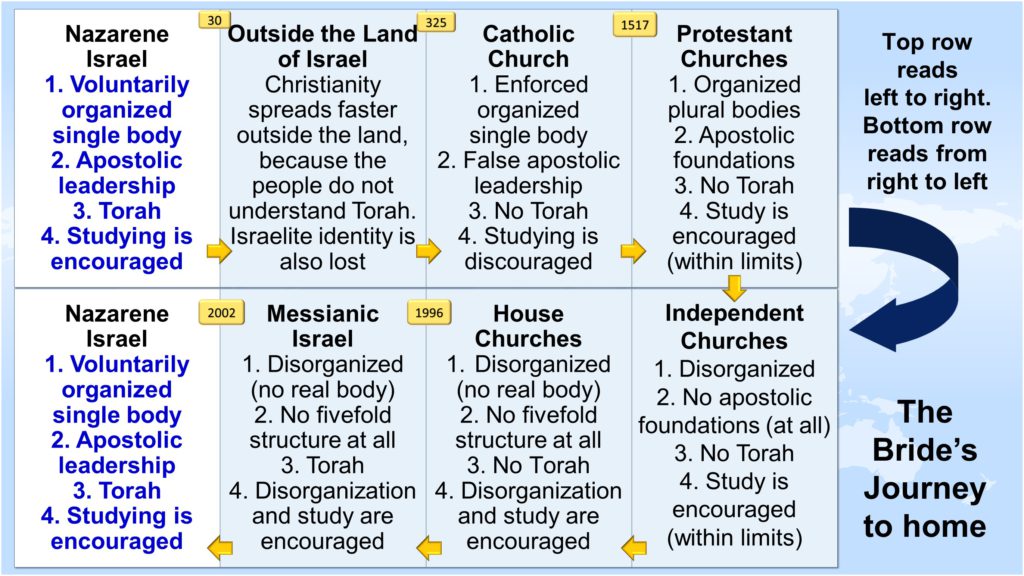
In Nazarene Israel we saw how the nation of Israel can be divided into two main prophetic groups, called the two houses of Israel. The southern house is called the house of Judah, while the northern house is called the house of Israel, or Ephraim. Originally the southern kingdom of Judah consisted of two (or some say three) tribes, while the northern kingdom had ten tribes. In broad, overly-general terms, today’s Jews descend spiritually from the house of Judah, while the Christians descend spiritually from the northern house of Israel (Ephraim). It was for this northern house of Israel that Yeshua said He was sent (on His first trip).
Mattityahu (Matthew) 15:24
24 But He answered and said, “I was not sent except to the lost sheep of the house of Israel.”
The situation became more complex over time, such that today there is more than one prophetic group of Jews, and more than one prophetic group of Ephraimites. Because the northern kingdom disobeyed the Torah, Yahweh sent the Assyrians to take Ephraim into physical and spiritual captivity (circa 732 BCE). After the time in captivity was up, they still did not repent, and so they were scattered into all nations, fulfilling the promises given to the patriarchs. (For details, see Nazarene Israel). At the same time the Assyrians also took most of the Jews into captivity. All of these are today in a kind of prophetic spiritual captivity in Assyria. Yeshua said He came to set these spiritual captives and oppressed ones free.
Luqa (Luke) 4:18
18 “The Spirit of Yahweh is upon Me, Because He has anointed Me To preach the gospel to the poor; He has sent Me to heal the brokenhearted, To proclaim liberty to the [spiritual] captives And recovery of sight to the blind, To set at liberty those who are [spiritually] oppressed….”
 In Revelation and the End Times we saw that most of the Ephraimites will not realize who they are until Yeshua returns at Armageddon, yet even today a small remnant is being called out to help re-establish the faith once delivered to the saints.
In Revelation and the End Times we saw that most of the Ephraimites will not realize who they are until Yeshua returns at Armageddon, yet even today a small remnant is being called out to help re-establish the faith once delivered to the saints.
Yehudah (Jude) 3
3 Beloved, while I was very diligent to write to you concerning our common salvation, I found it necessary to write to you exhorting you to contend earnestly for the faith which was once for all delivered to the saints.
To restore this original faith, we must realize that it was a Melchizedekian sect of Judaism that followed Yeshua as their one and only Rabbi. Because Yeshua is our one and only Rabbi, we also follow the rabbinic principle of imitating our Rabbi (Yeshua) in all things, to walk just as He walked.
Yochanan Aleph (1 John) 2:6
6 He who says he abides in Him ought himself also to walk just as He walked.
The phrase “walk just as He walked” is a Hebraic idiom meaning we should obey Yeshua’s halachah. The term halachah refers to the manner of walking out (i.e., living) the Torah. When we walk as our Rabbi Yeshua walked, imitating Him in all things, then it can be said that we are following Yeshua.
Shockingly, even while Yeshua lived, most of those who believed on Yeshua did not follow Him (obeying His halachah). For example, Mark 9:38 tells us there was a believer who was casting out demons in Yeshua’s name, and yet Yochanan (John) said he was not following Him (i.e., he was not keeping Yeshua’s halachah). What this means is that this believer was effectively practicing a different faith. However, although this man was keeping a different form of worship, Yeshua said not to stop him (because ultimately it would work in His favor).
Marqaus (Mark) 9:38-40
38 Now Yochanan (John) answered Him, saying, “Teacher, we saw someone who does not follow us casting out demons in Your name, and we forbade him because he does not follow us.”
39 But Yeshua said, “Do not forbid him, for no one who works a miracle in My name can soon afterward speak evil of Me.
40 For he who is not against us is on our side.”
So, if we are part of the remnant that is called to walk as Yeshua walked, and worship as He worshiped, then how did Yeshua live and worship? For one thing, it was His custom to go to the synagogue on the Sabbath.
Luqa (Luke) 4:16
16 So He came to Nazareth, where He had been brought up. And as His custom was, He went into the synagogue on the Sabbath day, and stood up to read.
In Judaism, to “stand up to read” refers to the reading of the Torah and Haftarah portions. Standing up to read is an honor which is only given to those who support the synagogue and are in good standing with the people. In context, then, we who seek to walk as Yeshua walked should seek to glorify Yahweh’s and Yeshua’s names through hosting a public Torah service where we live. History shows that this is what the Nazarenes did until they were driven underground by the Catholics in the fourth century. For example, consider this quote from the Catholic Church father Epiphanius of Salamis, who called the Nazarenes heretics because they “read the Law.” (Note: “The reading of the law” is a Hebraic idiom for the Torah service.)
The Nazarenes do not differ in any essential thing from them [the Orthodox Jews], since they practice the customs and doctrines prescribed by Jewish Law; except that they believe in Christ. They believe in the resurrection of the dead, and that the universe was created by God. They preach that God is One, and that Jesus Christ is His Son. They are very learned in the Hebrew language. They read the Law [the Law of Moshe] …. Therefore they differ…from the true Christians because they fulfill until now [such] Jewish rites as the circumcision, Sabbath and others.
[Epiphanius of Salamis, “Against Heresies,” Panarion 29, 7, pp. 41, 402]
In the first century, the Jews in the land understood that the Torah is a marital contract between Yahweh and Israel, and so the Torah-obedient Nazarene sect was able to spread. However, outside the land of Israel the gentiles did not understand the Torah’s role as a marital contract, and since Christianity is easier to practice than the Nazarene faith, torahless Christianity grew faster. Eventually the Roman Councils of Nicea and Laodicea banned the Nazarene Israelite faith.
Christians must not Judaize by resting on the Sabbath; but must work on that day, honoring rather the Lord’s Day [Sunday] by resting, if possible, as Christians. However, if any [Nazarene] be found Judaizing, let them be shut out from Christ.
[The Church of Rome; Council of Laodicea under the Emperor Constantine; Canon 29, 336 CE]
However, let us realize that not everything the Catholic Church did (or does) is wrong. It is often said that Satan prefers forgeries that are as close to the original as possible, so let us see what changed from the Nazarene faith to the Catholic faith—and what did not.

If we are willing to accept it, both the Nazarene and the Catholic faiths are organized globally. Both seek to establish a global kingdom (one for Yeshua, and one for Babylon). Both teach a single doctrine, and while they arrive at those doctrines differently, both vest decision-making authority in a single individual (e.g., Yaakov in Acts 15, vs. the pope). Both have a separate priesthood. If we have eyes to see and are willing to accept it, the main difference is that because the Roman Church has a Babylonian spirit, it is subject to fragmentation. First the Roman church fragmented into eastern and western halves in the Great Schism of 1054. Then the Western Roman Church (Western Leg) began to fragment further in the Protestant Reformation of 1517 CE. First new denominations were formed (e.g., Lutheran Church), and then national denominations followed (e.g., Church of England, Church of Sweden). The reason they can never unify as a single body is that they have a distorted image of who Yeshua is. Because they do not know who Yeshua is or what He wants they are not able to walk as He walked, or live as He lived. Therefore, they are not in unity with Yeshua (and Yeshua is not in unity with them). Because of this, their bodies will always be fragmented, unless they are held together by force (such as with the upcoming NWO police state).
While the break with Rome was unavoidable, it is not a small thing for Yeshua’s body to fragment (as splitting is the opposite of a unified global government without end). The idea of a split body was unacceptable to Martin Luther, because (by definition) a split makes for more than one body of Messiah. That is why Martin Luther first tried to reconcile with Rome (to reform the body, rather than to split it). It was only after Rome sought to kill him that he accepted the need to break with Rome.
Fragmentation leads to more fragmentation. Just as the torahless Christian faith was more popular outside the land of Israel than the Nazarene faith, so too is passive (lazy) disunity more popular with many Messianics. Five hundred years after Luther’s protest, most Christians and Messianics think there is nothing wrong with setting up independent ministries, which do not contribute to the unity of the larger Melchizedekian global order. They have forgotten Yeshua’s dictum that he who does not gather together with Him (and His body) scatters abroad (and will be punished).
Mattityahu (Matthew) 12:30
30 “He who is not with Me is against Me, and he who does not gather with Me scatters abroad.”
Just as in the first century, today there are many different groups who feel they can “follow Yeshua” and “keep the Torah” without contributing to the establishment of His global Melchizedekian government without end. What they need to realize is that unless and until they join the faith that Yeshua taught and contribute to the growth of Yeshua’s global Melchizedekian order, they are still in Babylon (and are not doing His will).

In the graphic, the spiritual captives of Ephraim have already passed through many phases on their way back to the original faith. However, at the same time, they are also becoming more and more fragmented, because until they truly leave the Babylonian church system and come back to the original faith, they are still in error. We should also note that the final step is the hardest of all the transitional steps, especially for fractious Ephraim, because rather than adopting more fragmentation and division, to come back to the original Nazarene faith calls for each of us to do what we can to find the place where we can contribute best to His cause. And until we are giving our fair share, we are not truly in His will.
Today we are more scattered than ever, and the end times are upon us. The New World Order will soon be a reality, so how can we reverse this trend? How can we begin to rebuild a global body for Yeshua, by His Spirit? If Yahweh wills, Nazarene Israel hopes to establish an Internet Torah service, so that all those who do not have a participating local synagogue can still congregate, and worship as Yeshua did. If Yahweh wills, hopefully this will lead to more local assemblies and more local Torah services, as Yahweh inspires more congregational elders to host public Torah readings, to praise His name in their towns. When we His people begin to host His form of worship in every city all around the world, it will be the fulfillment of what was envisioned in Acts 15, that the new baby believers could learn how to worship the King above all kings by participating in their local Nazarene synagogue.
Ma’asei (Acts) 15:19-21
19 Therefore I judge [i.e., rule] that we should not trouble those from among the Gentiles who are [re]turning to Elohim,
20 but that we write to them to abstain from things polluted by idols, from sexual immorality, from things strangled, and from blood.
21 For Moshe has had throughout many generations those who preach him in every city, being read in the synagogues every Sabbath.”
Yet while the online broadcast will be beneficial for those who have no participating local assembly, better still will be for the devout to participate in their local assembly and collaborate with others to glorify and magnify the names of Yahweh and Yeshua in their localities, as there is a myriad of benefits to fellowship and assembling that a virtual synagogue can never provide. Yet we pray it will be a good start, and that you will join us in serving Him the way He says He wants to be served.